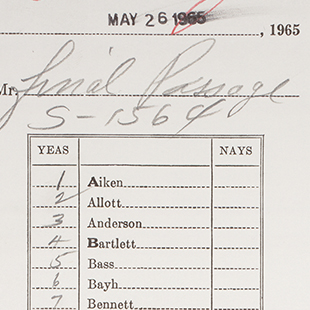
Congress and the Voting Rights Act of 1965
Despite the ratification of the Fifteenth Amendment in 1870, African Americans in the South faced tremendous obstacles to voting. As a result, very few African Americans were registered voters, and they had very little, if any, political power, either locally or nationally. Reconstruction Era attempts to enforce the 15th Amendment were struck down by the Supreme Court in 1883, an action that ended the federal government’s efforts to protect civil rights for decades.
By the 1950s the civil rights movement galvanized the nation. Congress passed Civil Rights Acts in 1957, 1960, and 1964, but none of these laws were strong enough to prevent voting discrimination by local officials. On March 7, 1965, peaceful voting rights protesters in Selma, Alabama were violently attacked by Alabama state police. News cameras filmed the violence in what became known as “Bloody Sunday.” Many Americans and members of Congress began to wonder if existing civil rights laws would ever be properly enforced by the local authorities. The question before Congress was whether the federal government should guarantee the right to vote by assuming the power to register voters. Since qualifications for voting were traditionally set by state and local officials, federal voting rights protection represented a significant change in the constitutional balance of power between the states and the federal government.
Congress passed the Voting Rights Act of 1965 which aimed to increase the number of people registered to vote in areas where there was a record of previous discrimination. The legislation outlawed literacy tests and provided for the appointment of Federal examiners (with the power to register qualified citizens to vote) in certain jurisdictions with a history of voting discrimination. In addition, these jurisdictions could not change voting practices or procedures without "preclearance" from either the U.S. Attorney General or the District Court for Washington, DC. This act shifted the power to register voters from state and local officials to the federal government.
Because the Voting Rights Act of 1965 was the most significant statutory change in the relationship between the Federal and state governments in the area of voting since the Reconstruction era, it was immediately challenged in the courts. Between 1965 and 1969, the Supreme Court issued several key decisions upholding the constitutionality of the law [See South Carolina v. Katzenbach, 383 U.S. 301, 327-28 (1966) and Allen v. State Board of Elections, 393 U.S. 544 (1969)].
View the documents below for more information on the creation of the Voting Rights Act of 1965.
 Photograph of the Ruins of the Mt. Pleasant Society Hall in Gluckstadt, Mississippi, August 11, 1964
Photograph of the Ruins of the Mt. Pleasant Society Hall in Gluckstadt, Mississippi, August 11, 1964
 President Lyndon Johnson’s Speech to Congress on Voting Rights, March 15, 1965
President Lyndon Johnson’s Speech to Congress on Voting Rights, March 15, 1965
 Letter from Mrs. E. Jackson in Favor of Voting Rights, March 8, 1965
Letter from Mrs. E. Jackson in Favor of Voting Rights, March 8, 1965
 Letter from Mr. George Neu Against Voting Rights, March 26, 1965
Letter from Mr. George Neu Against Voting Rights, March 26, 1965
 Statement of Congressman John Conyers, Jr. on H.R. 6400, April 1, 1965
Statement of Congressman John Conyers, Jr. on H.R. 6400, April 1, 1965
 Roll Call Vote Tally on S. 1564, the Voting Rights Act of 1965, May 26, 1965
Roll Call Vote Tally on S. 1564, the Voting Rights Act of 1965, May 26, 1965
 The Voting Rights Act of 1965, August 6, 1965
The Voting Rights Act of 1965, August 6, 1965
If you have problems viewing these images please contact legislative.archives@nara.gov.